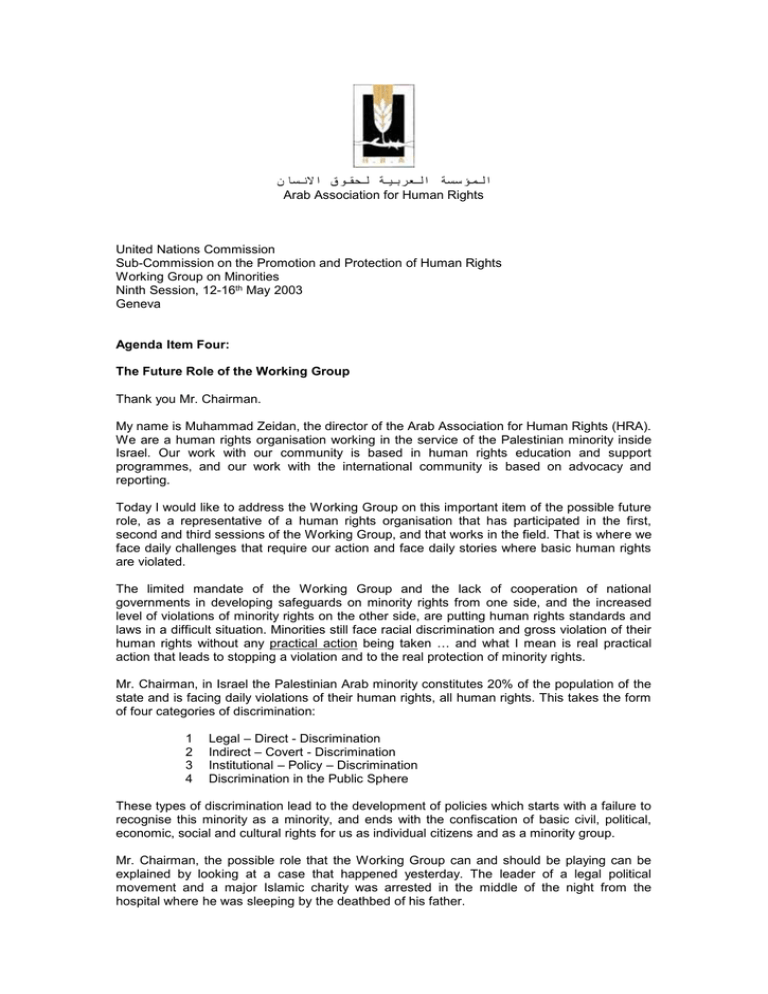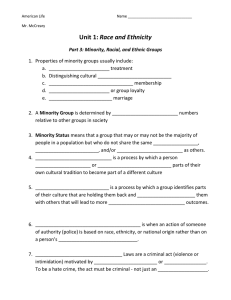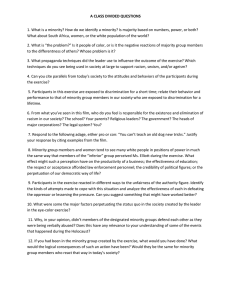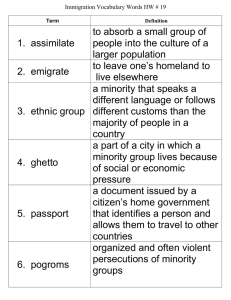ناسنلاا قوقحل ةيبرعلا ةسسؤملا Arab Association for Human Rights United Nations Commission
advertisement

المؤسسة العربية لحقوق االنسان Arab Association for Human Rights United Nations Commission Sub-Commission on the Promotion and Protection of Human Rights Working Group on Minorities Ninth Session, 12-16th May 2003 Geneva Agenda Item Four: The Future Role of the Working Group Thank you Mr. Chairman. My name is Muhammad Zeidan, the director of the Arab Association for Human Rights (HRA). We are a human rights organisation working in the service of the Palestinian minority inside Israel. Our work with our community is based in human rights education and support programmes, and our work with the international community is based on advocacy and reporting. Today I would like to address the Working Group on this important item of the possible future role, as a representative of a human rights organisation that has participated in the first, second and third sessions of the Working Group, and that works in the field. That is where we face daily challenges that require our action and face daily stories where basic human rights are violated. The limited mandate of the Working Group and the lack of cooperation of national governments in developing safeguards on minority rights from one side, and the increased level of violations of minority rights on the other side, are putting human rights standards and laws in a difficult situation. Minorities still face racial discrimination and gross violation of their human rights without any practical action being taken … and what I mean is real practical action that leads to stopping a violation and to the real protection of minority rights. Mr. Chairman, in Israel the Palestinian Arab minority constitutes 20% of the population of the state and is facing daily violations of their human rights, all human rights. This takes the form of four categories of discrimination: 1 2 3 4 Legal – Direct - Discrimination Indirect – Covert - Discrimination Institutional – Policy – Discrimination Discrimination in the Public Sphere These types of discrimination lead to the development of policies which starts with a failure to recognise this minority as a minority, and ends with the confiscation of basic civil, political, economic, social and cultural rights for us as individual citizens and as a minority group. Mr. Chairman, the possible role that the Working Group can and should be playing can be explained by looking at a case that happened yesterday. The leader of a legal political movement and a major Islamic charity was arrested in the middle of the night from the hospital where he was sleeping by the deathbed of his father. Sheikh Ra’ad Salah, the leader of the Northern Branch of the Islamic Movement and the AlAqsa Association for the Preservation of Places of Worship was arrested on the 12th of May along with 14 of the leadership of his political movement. Um al-Fahm, where the movement is based, is a town in Israel full of Israeli citizens but it was entered that night by a force of 1000 armed police as if it were enemy territory outside the state. Most disturbingly, the police at his subsequent trial hearing have admitted that they have no evidence to support the accusation that the Islamic Movement has channeled funds to “terrorist” organisations in the West Bank. This is part of a campaign to eliminate the Northern Branch of the Islamic Movement that has been going on for several years, and has been tracked by the HRA. A series of measures have been imposed, including bans on the freedom of movement of the religious leaders involved and confiscation of collected charity funds. This story shows the need for practical action to make the working group able to respond and take that practical action when urgent and gross violations are occurring. This action should include an immediate communication to the specific government of the state and the direct engagement of other existing United Nations mechanisms, including the Special Rapporteurs and Human Rights Committees. As a final remark, I would like to congratulate the Working Group for starting the process of developing studies on regional mechanisms, and I would also like to invite the Working Group to start using this process on specific minority groups, such as the Palestinian minority inside Israel. This studies can be a strong tool for understanding specific places and designing specific actions to protect the rights of each particular minority. Thank you.



